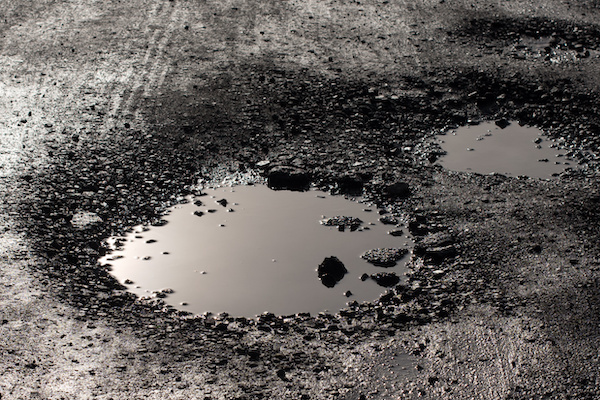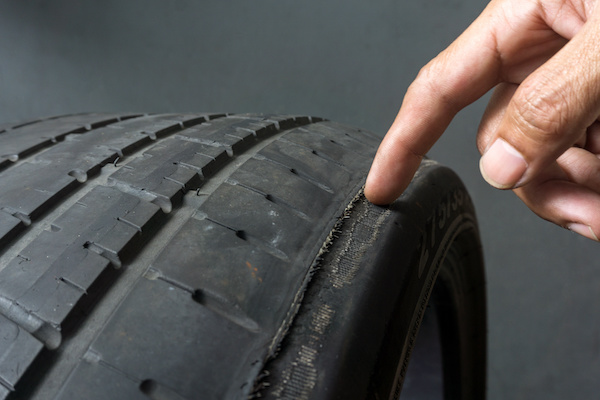Posted on 7/27/2022

Potholes are not just a pain in the seat, they can really damage your vehicle too, even parts of your car you wouldn't expect. Roads are most likely to form potholes in the spring and winter due to ice and running water wreaking havoc on the base layers underneath the pavement. Potholes occur when the soil beneath the pavement gets displaced or weakened. As traffic drives over the weaker spots the pavement cracks and leaves a hole in the road surface. Potholes start out small but can grow into huge car eating monsters. After hitting a pothole, the first thing to check are the tires & wheels. Potholes can cause major damage to tires such as sidewall bulges, flats or tread separation. This is caused by the hard edges left surrounding the pothole which can slice the rubber and then suddenly it's deflate gate. Wheels are susceptible to cracks, bends and chips on contact with a pothole. A bent wheel might lose its airtight seal, or won't roll correctly. Chips are easy to ... read more
Posted on 6/27/2022

Every component of your vehicle is critical to maintaining efficiency. Tires, for example, are essential to your vehicle's maintenance. Therefore, you must inspect your tires regularly to determine their condition. While tire wear is inevitable, understanding what causes them to wear down rapidly can help you prevent an accident and save you money in the long run. You might quickly lose control of your vehicle and cause accidents if your tires don't have enough traction on the road. Some drivers are baffled as to why their tires wear out so rapidly. Several factors can cause premature tire wear. Read on and get educated on why your tires are wearing out too fast. Proper Tire Pressure Low tire pressure is a significant cause of premature tire wear and failure on the road. Tires lose pressure because of regular driving. Make sure your tires are correctly filled at least once a week. Over-inflation is just as harmful when tires wear down in the central treads. This also lowers ... read more
Posted on 5/26/2022
.jpeg)
If you're driving your car and the steering system warning light suddenly comes on, your first instinct might be to panic and pull over to the side of the road so you can assess the problem. The steering system warning light could be signaling any number of problems. But it probably isn't anything that will result in an immediate breakdown of your vehicle or cause permanent damage to your steering system. Meaning of the Light If your steering system warning light is illuminated, it means there's a fault in one of your power steering components. You should get it checked as soon as possible Hydraulic Power Steering Systems These systems use fluid power to deliver a controlled level of assistance at low speeds. As you increase your speed, however, more force is required to move the wheels and provide steering assistance. To indicate that there's a problem with these systems, most cars will flash or illuminate a Power Steering warning light in your instrument cluster o ... read more
Posted on 4/28/2022
.jpeg)
While you're driving, sensors throughout the vehicle are constantly monitored to verify that everything is functioning properly. The ABS, which stands for anti-lock braking system, is one of the systems that is being checked. The ABS keeps track of the wheels to ensure that they are all running at about the same speed. During slippery situations, the system might apply the brakes to keep the car under control. What does the ABS light indicate? The ABS system monitors the rotational speed of each wheel using sensors. To ensure the car is steady and under control, a computer checks the signals from all four wheels as well as the location of the brake pedal. If the computer detects any aberrant signals or the absence of a signals from some of the sensors, the ABS warning light will illuminate to inform the driver. The computer can turn on the ABS light for a variety of reasons, including low braking fluid levels or a blown fuse, in addition to monitoring the wheel speed sensors. S ... read more
Posted on 3/28/2022
.jpeg)
If your car is giving you problems, it may be time for a tune-up. A tune-up can help improve your car's performance and fix any issues that are causing it to run poorly. In this blog post, we will discuss the most common symptoms that indicate you need a tune-up. Engine Light Turns On One of the most common symptoms that indicate you need a tune-up is when your engine light turns on. If this happens, take your car to a mechanic and have them check it out. Issues With Your Brake System Another symptom that indicates you need a tune-up is if you're having issues with your brake system. If your brakes are making noise or not working correctly, you should head to your mechanic as soon as possible as this is a serious safety issue. Car Vibrating If your car is vibrating, it may be a sign that you need a tune-up. This can be caused by many different things, but some issues can severe. It's an indication that something may not be functioning properly. Fuel Efficiency Dropp ... read more